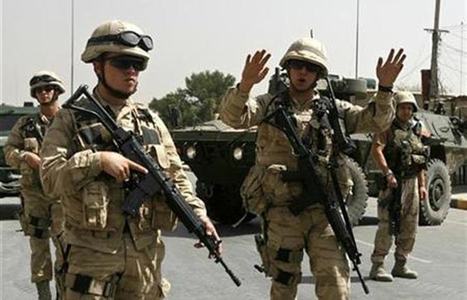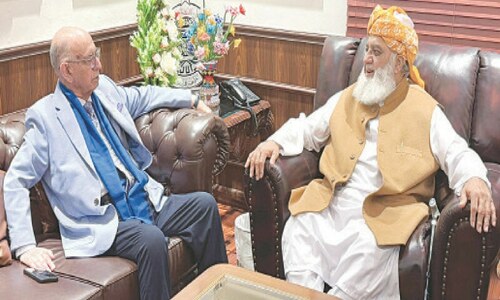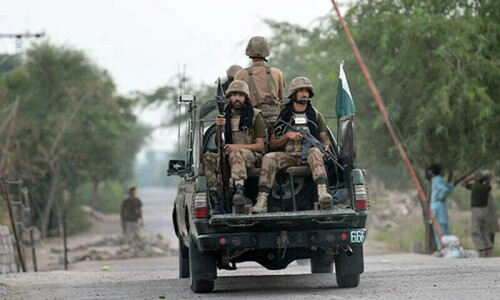The 30-nation North Atlantic Treaty Organisation (Nato) has deferred their decision on whether to withdraw all foreign troops from Afghanistan by May 1, as required by the peace agreement between the United States and Taliban.
But hours before Nato Secretary-General Jens Stoltenberg announced the decision at a virtual news conference on Thursday afternoon, the US assured Afghan President Ashraf Ghani that Washington will continue to consult Kabul before taking any final decision.
Secretary Blinken’s telephone call to President Ghani followed Stoltenberg’s statement on Wednesday that the military alliance will only leave Afghanistan when security conditions allow.
“We will only leave when the time is right and the focus now is on how we can support the peace talks,” he told reporters after the first day of the Nato defence ministers' conference. The virtual conference was expected to take a final decision on the May 1 withdrawal deadline, set in the US-Taliban agreement signed early last year. US Secretary of Defence Lloyd J. Austin represented Washington in the conference.
Soon after the two-day conference ended on Thursday afternoon, the Pentagon released a report in Washington which quoted Stoltenberg as saying that the ministers also discussed the situation in Afghanistan and the progress of the peace process and decided to “defer their decision".
Alliance defence ministers, however, agreed to raise the number of troops for the Nato Mission in Iraq from 500 to 4,000, Stoltenberg said at his virtual news conference.
"We are faced with many dilemmas, and there are no easy options," said Stoltenberg while explaining why the alliance did not announce a decision on Afghanistan.
"At this stage, we have made no final decision on the future of our presence. But as the first of May deadline is approaching, Nato allies will continue to closely consult and coordinate in the coming weeks,” he said.
Stoltenberg urged Taliban leaders to live up to their commitments in the peace agreement to reduce violence, disown terrorist groups and negotiate honestly with the Afghan government.
"The peace process is the best chance to end years of suffering and violence and bring lasting peace," he said. "It is important for the Afghan people for the security of the region and for our own security."
He called on all sides to re-energise the peace process.
"Nato's goal is to ensure that Afghanistan never again becomes a safe haven for terrorists that would attack our homelands, so allies will continue to assess together the conditions on the ground," Stoltenberg said. "As we do, the protection of our troops remains paramount, and we will take all necessary measures to keep them safe."
Apparently, the decision was delayed on Washington’s request, as none of the 30 Nato member governments has publicly supported the May 1 withdrawal deadline. Instead, several allies have indicated their support for prolonging the Nato troop presence in Afghanistan.
The move required Secretary Blinken to assure the Afghan president that “the United States will continue close consultations with Afghanistan’s leaders, Nato Allies, and international partners on the way ahead.”
A readout of the conversation released by Blinken’s office in Washington on Thursday said the chief US diplomat called the Afghan leader to discuss America’s ongoing review of its strategy in Afghanistan.
The Secretary reiterated America’s commitment to support the peace process, “aiming for a just and durable political settlement and permanent and comprehensive ceasefire,” the statement added.
Nato has about 10,000 — mostly non-American — troops in Afghanistan to train and advise the Afghan security forces and has indicated that it would like to continue its mission.
“Our presence in Afghanistan is condition-based, and the Taliban has to meet their commitments,” Stoltenberg said on Wednesday. “The main issue is that the Taliban has to reduce violence."
The Nato chief also noted in his previous statement that the talks between the Afghanistan and Kabul government were moving at a slow pace while the peace deal required the Taliban to “negotiate [with Kabul] in good faith".
The US-Taliban peace agreement required the Taliban to reduce violence, implement a durable ceasefire, hold meaningful negotiations with Kabul and sever all links to al-Qaeda and other terrorist outfits.
At a news briefing in Washington, State Department spokesperson Ned Price refused to say if Secretary Blinken would also hold direct talks with Taliban leaders as his predecessor Michael Pompeo did.
“I don’t have anything to say in terms of direct engagement with the Taliban at this point but, of course, we support those ongoing discussions as part of our effort to bring peace and security — and stability — to Afghanistan in the form of a just and durable negotiated settlement,” he said.
Nato also issued a brief statement on the defence ministers’ meeting, declaring that their missions in Afghanistan and Iraq were “key contributions to the fight against international terrorism".
On Afghanistan, ministers reiterated their commitment to the Nato-led Resolute Support Mission — with training and funding for the brave Afghan security forces. But they also expressed their strong support to the Afghan peace process, which they said was “the best chance to end years of suffering and violence and bring lasting peace to Afghanistan".















































